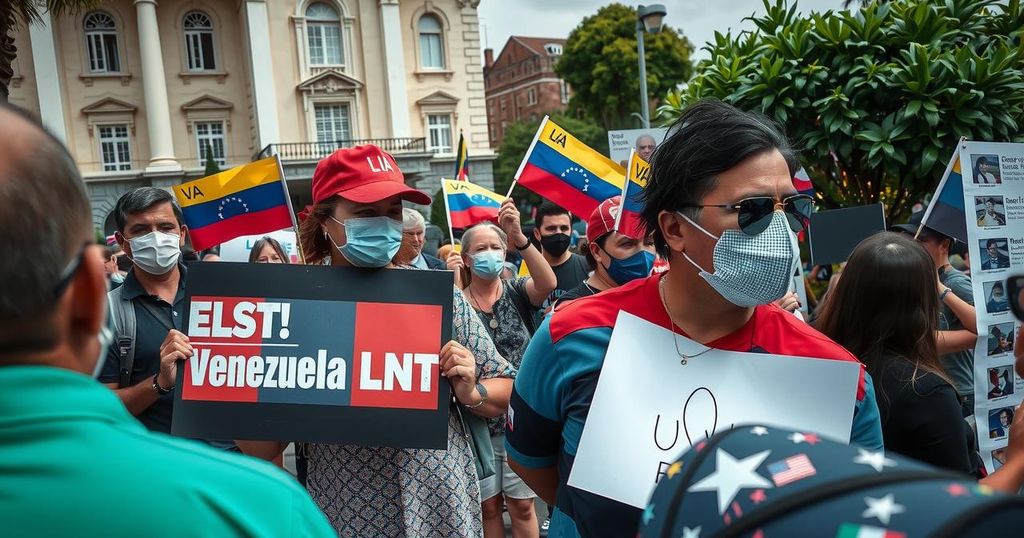Opponents of the Venezuelan government at the Argentine embassy in Caracas protested against police presence outside the building. The U.S. and Argentina condemned these actions as violations of international law and harassment. Tensions escalated after political leader Maria Corina Machado called for mobilization ahead of planned protests. The situation highlights ongoing concerns regarding political repression and the safety of asylum-seekers in Venezuela.
Opponents of the Venezuelan government, sheltering at the Argentine embassy in Caracas, have voiced their concern over police and intelligence operatives stationed outside the facility for extended periods. Their protest was prompted by a call from the United States government, which condemned the situation as a serious breach of international law, with Argentina’s Foreign Ministry labeling it harassment. Most of these dissenters belong to the Vente Venezuela party, whose leader, Maria Corina Machado, has highlighted the increasing aggression from government officials against the embassy, describing it as a new siege by masked authorities that commenced on Saturday night and continued into Sunday.
This unsettling incident unfolded shortly after Ms. Machado urged for a widespread mobilization scheduled for December 1, further inciting tensions as Venezuela’s interior minister accused her of plotting against President Nicolas Maduro’s administration. According to Vente Venezuela, there is currently a lack of electricity at the embassy, which is encircled by regime vehicles restricting access and disrupting communication signals. The Argentine Foreign Ministry expressed concern regarding the armed troop presence, emphasizing that these actions represent a significant disturbance to security and called for international condemnation of these developments.
In a related statement, the U.S. Embassy in Venezuela decried the actions against the asylum-seekers, stating, “The deployment of armed forces and blockades seriously violate international law.” They further emphasized the necessity for the Venezuelan regime to honor its international commitments, cease intimidating behaviors, and ensure the safe passage of individuals seeking asylum. Diplomatic relations between the United States and Venezuela have been strained since 2019, worsening over the years.
Opposition members have taken refuge in the embassy since March, following the issuance of arrest warrants by the Venezuelan Attorney General’s Office, which accused them of inciting violence to destabilize the Maduro government. There has also been a history of tensions involving Brazil and Argentina in protecting their diplomatic missions amid accusations from Venezuela regarding alleged misuse of these embassies for terrorist activities.
The situation surrounding the Argentine embassy in Caracas reflects the broader political unrest in Venezuela, particularly regarding human rights and asylum seekers. Since 2019, relations between Venezuela and several neighboring countries, notably Argentina and Brazil, have significantly deteriorated due to accusations of government repression and fraudulent elections. The opposition leaders’ presence in the Argentine embassy highlights their dire circumstances, seeking asylum from what they describe as a tyrannical regime. The international community, particularly the United States, has increasingly criticized the Venezuelan government’s oppressive tactics against political dissent.
In summary, the ongoing presence and treatment of Venezuelan government opponents at the Argentine embassy in Caracas raise significant concerns regarding international law and human rights. The actions by local authorities have been condemned by both the U.S. and Argentina, emphasizing the need for international scrutiny of Venezuela’s increasingly authoritarian measures. The situation underscores a troubling trend of escalating government harassment of political dissent and the urgent need for mechanisms to protect asylum-seekers.
Original Source: www.voanews.com






